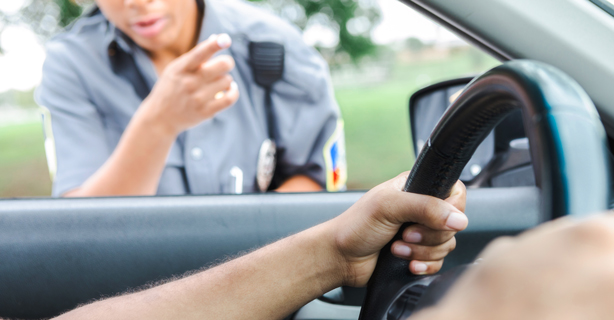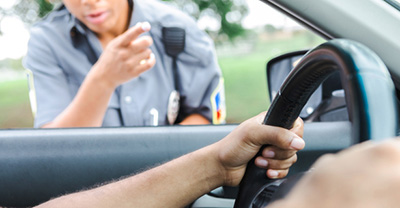Driving without insurance


0 min. read
What happens if you’re caught driving without insurance?
Being insured is a requirement when driving a vehicle in almost every state, so getting caught driving without insurance coverage can leave you vulnerable to financial loss and penalties by law.
Driving without car insurance coverage could be a costly choice
Car insurance protects you as a driver, as well as others you encounter on the road. You may choose to forego auto insurance in hopes of getting away with temporary savings. But you could wind up paying thousands of dollars if you get caught or have an accident.
Before you consider driving without insurance, we want to help you understand the risks—and help you choose more wisely.

What are the penalties for driving without proof of insurance?
Penalties for driving without insurance vary from state to state. Depending on where you drive, you could face any of the following if you're pulled over and don't have insurance:
Fines
Driver's license suspension
Vehicle impoundment
Jail time
Regardless of the state you drive in, you're likely to have harsher consequences for repeated violations. Bottom line: getting caught driving without insurance will almost always come with consequences.
Is auto insurance required?
It's the law in all states—except Virginia (if you pay the uninsured motorist fee) and New Hampshire. This helps protect you, your passengers, and those you encounter on the road.
Each state has minimum car insurance requirements on the coverages that are your responsibility to have.
Most individuals who own or drive a vehicle need the following car insurance coverages:
Bodily injury liability
This insurance coverage applies when you cause an accident while you're operating your vehicle and helps pay for bodily injuries to others.
Property damage liability
This type of insurance coverage helps pay damage costs for another person's property in an accident you cause.
Uninsured/underinsured motorist protection
If you're hurt in an accident involving an at-fault driver who doesn't have any or enough car insurance, this helps pay for your injuries. Many states allow you to opt out or reject this coverage.

What are the associated costs of driving without insurance?
Financially speaking, driving without insurance can be costly, even more than just the costs insurance would've paid for. If you're pulled over and can't provide proof of valid car insurance, you could end up paying:
Fines
Fines are state-specific and can range from very nominal to thousands of dollars. Here are some examples of the consequences of driving without insurance:
Delaware: The fine for your first offense is $1,500 for driving without insurance and $3,000 for repeat offenses.*
Illinois: Fines start at a $500 minimum for driving uninsured and go up to $1,000 for a previous driving without insurance violation.*
Texas: There can be a fine from $175-$350 for a first offense and $350-$1,000 for subsequent violations.*
Florida: Floridians caught driving without insurance pay a $150 fine for a first offense, $250 for a second offense within three years, and $500 if convicted three times within three years.*
Driver's license and registration reinstatement fees
Some states may have harsher consequences, such as suspending your driver's license and registration and requiring you to pay higher fees to reinstate them. Let's review some state-specific examples:
Missouri
Depending on how many times your license was suspended for driving without insurance, you can pay as little as $20 or as much as $400 to reinstate your license in Missouri.*
Arizona
In the state of Arizona, drivers who have their license suspended for violating car insurance laws pay a $10 reinstatement fee and $10-$25 for a license reinstatement application fee.*
Pennsylvania
Facing a three-month suspension of your driver's license and registration in Pennsylvania for driving without insurance can leave you with a fee of $94 to restore your license and $98 to restore registration.*
Impoundment and towing fees
Many states give police the right to impound your vehicle if you can't provide proof of insurance, leaving you responsible for towing fees and other associated costs.
Bail money
While it's unlikely for a first offense, you could face jail time for driving without insurance. In Michigan, persons convicted of driving uninsured can face up to one year in jail, a $500 fine, or both.* These costs add up quickly.
Before you drop your insurance coverage, consider these safer, lower-cost alternatives to help keep you moving:
What happens if you get into an accident with no insurance?
If you cause the crash, you could:
Be held liable for any bodily injuries and property damage
Pay fines
Have your license suspended
Have your vehicle impounded
If you're not at fault, the law and subsequent penalties vary by state and accident.
When fault is unclear, you may be responsible for handling communication with the other party's car insurance company, which can be time consuming and frustrating. It may also reduce your chances of receiving compensation.
Can you lose points for driving without insurance?
Instead of losing points, you'd likely have your license suspended altogether. First, not every state has a point system for violations. For example, the state of Louisiana records driving violations on your driving record, but not with a point system.
Second, states that do utilize a point system typically track moving/traffic violations as point deductions, whereas a driving without insurance penalty is a suspended license and registration—most commonly after a second or third offense.

Keep your vehicle covered and compliant.
Get an auto insurance quote today.
Is driving without insurance a misdemeanor or a felony?
In most states if you're caught breaking auto insurance laws, the conviction is considered a misdemeanor. While misdemeanors are less serious than felonies, they can require jail time depending on the degree of infraction.
Typically, a first-time driving without insurance offence wouldn't fall under a misdemeanor classification. You can expect to see that for a second or third driving uninsured conviction, and in a state like New Mexico, can leave you imprisoned up to six months.
Can a cop tell if you don't have insurance?
Yes, the police can tell whether you have valid auto insurance. Here are a couple of ways it's determined:
Proof of insurance requests
When a driver is pulled over, police request to review proof of insurance in addition to a driver's license and vehicle registration. Expired insurance, failure to present proof of insurance, and fraudulent coverage lead to insurance law infractions.
Law enforcement data bases
In most states, police officers use in-car technology to see if a driver has auto insurance before they even pull you over.
Although this information is accessible to law enforcement, stopping a driver for the sole purpose of a driving without insurance violation isn't likely. As a secondary violation, driving uninsured is typically charged in conjunction with other violations like:
Vehicle equipment malfunction
Speeding
Texting and driving
Tailgating
Expired license plates
These are just some examples among many other violations. Regardless of the reason you could be stopped, having valid car insurance and keeping it on-hand in your vehicle will help save you from additional, and often expensive, consequences.
Can you drive home from the dealership without insurance?
No. Car insurance is required in almost every state. So, if you don't already have auto insurance when buying your brand-new car or for driving a new-to-you vehicle off of a used car lot, consider the following:
Plan ahead
If you're able to plan ahead in your car purchasing process, it's best to shop around for car insurance before buying a car. Planning can help you understand:
How much money you could save
Which coverages you'll want
Who you'll be contacting to help finalize your insurance once you select a car
Get instant insurance
Although planning ahead to find out which insurance company is the best for you and your car, it's not always possible. That's why most insurance providers offer instant online quotes, discounts, and coverages. While you're at the dealership, you'll be able to set up your insurance before starting your vehicle.
Review dealership finance plans
If you're planning to receive financing through your dealership, the dealer will require that you have car insurance in place before you drive off the lot. While it's the law to insure your car, purchasing insurance is also a contingency to receiving financing.
What happens when police seize your car for no insurance?
In most states, if your car is seized by police due to driving without insurance, it's towed to an impound. If you're unsure where your car was towed, you can search using your car's VIN and then follow these steps to get your towed vehicle back.
Find cheap car insurance so you're not caught driving uninsured
You can get a Dairyland auto insurance policy by starting your fast, free quote for cheap car insurance now. We offer:
Affordable rates
Flexible payment plans
Low down payments
Exceptional service
Reliable customer support—regardless of your financial history or unique challenges
To get a quote, you'll need to tell us about:
Yourself, including your age, driving record, and where you live
The type and number of vehicles you want to insure
Others who live with you and/or who you expect to drive your vehicle
We're here to help as you make important auto insurance policy decisions for your specific circumstances and financial situation. Call a knowledgeable Dairyland associate at 888-344-4357 for more information.
The general information in this blog is for informational or entertainment purposes only. View our blog disclaimer.
*Data accuracy is subject to this article's publication date.










